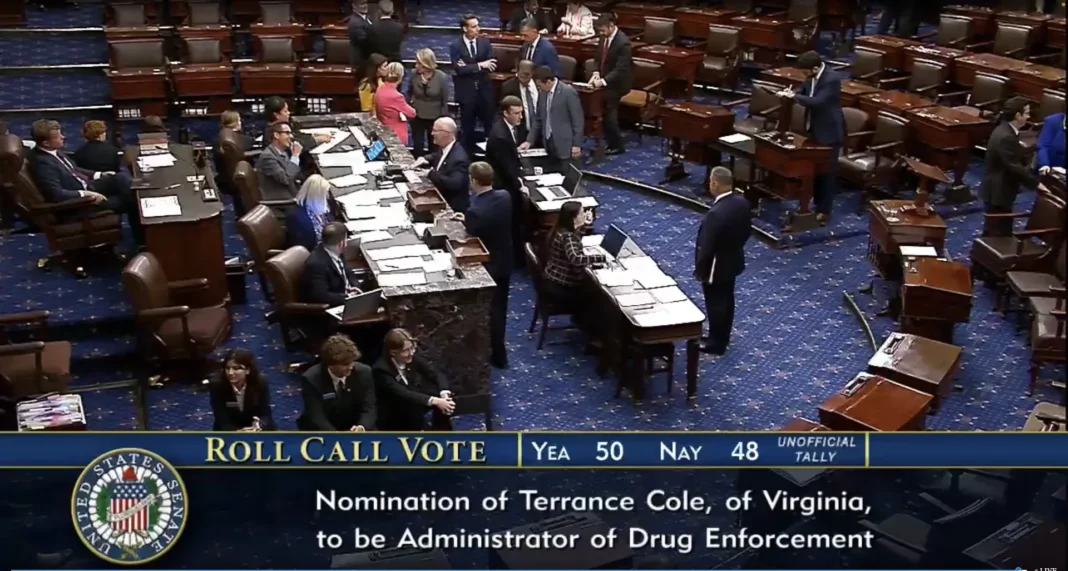Terrance Cole has now been appointed as permanent chief of the Drug Enforcement Administration. This means he will oversee the historic cannabis rescheduling program.
Cole’s confirmation was approved today by the US Senate, 50 to 48.
Cole had narrowly won a Monday vote (44-43) invoking cloture. This effectively ended the debate, and opened up his final hearing for today.
The future of the rescheduling project, and the future near-term prospects of the US cannabis industry, now rest in the hands of the 22-year DEA veteran of the former homeland security chief under Virginia Governor Glenn Youngkin.
Since January, the DEA administrator has had a much greater impact on the cannabis rescheduling process.
As required to report progress on a 90-day basis, the DEA sent DEA Administrative Law Judge John Mulrooney a message stating no progress was made over the past six months.
This was attributed largely to the temporary nature of the DEA’s leadership, with the report stating that the ‘interlocutory appeal Motion to Reconsider remains pending with the Acting Administrator (Robert Murphy), and no briefing schedule had yet been set.’
Mulrooney requested that the DEA administrator’s office set a hearing schedule, and hear oral arguments for the purpose of moving the process along. However, these actions have been put on hold pending Cole’s nomination.
This uncertainty has caused frustration in reformers and industrial groups. Some have even filed lawsuits, or asked for clarification on the role they played.
After President Trump signs into his new position, which usually takes a couple of days, industry leaders will hope he keeps his word and gets the process back on track.
During a confirmation hearing in May, he informed lawmakers that reviewing the stalled process would be ‘one of my first priorities’ if confirmed.
But the veteran law enforcement officer did not endorsing a reclassification proposal, saying that he needed to research the topic further.
Cole acknowledged delays in the DEA’s ongoing review of cannabis’s status under federal law, stating that he was ‘not familiar exactly where we are, but I know the process has been delayed numerous times, and it’s time to move forward.’
When pressed by Sen. Alex Padilla, a Democrat from California, as to whether he would commit to seeing the process through, he declined to offer a concrete position, stating only that he ‘need(s) to understand more where the agencies are, and look at the science behind it,” he said, adding that he wanted to ‘listen to the experts’ before making a determination.
Terrance Cole has now been appointed as permanent chief of the Drug Enforcement Administration. This means he will oversee the historic cannabis rescheduling program.
Cole’s confirmation was approved today by the US Senate, 50-48.
Cole had narrowly won a Monday vote (44-43) invoking cloture. This effectively ended the debate, and opened up his final hearing for today.
The future of the rescheduling project, and the future near-term prospects of the US cannabis industry, now rest in the hands of the 22-year DEA veteran of the former homeland security chief under Virginia Governor Glenn Youngkin.
The DEA Administrator has a greater say in this process now that the former president Biden’s project to reschedule cannabis, which was started in January of last year, is still in limbo.
As part of the requirement to provide an update every 90 days on the progress made, the DEA sent a letter to DEA Administrative Law Judge John Mulrooney stating there had not been any progress in the last six months.
This was attributed largely to the temporary nature of the DEA’s leadership, with the report stating that the ‘interlocutory appeal Motion to Reconsider remains pending with the Acting Administrator (Robert Murphy), and no briefing schedule had yet been set.’
Mulrooney requested that the DEA Administrator’s Office set a hearing schedule, and hear any oral arguments for the purpose of moving the process along. However, these actions have been put on hold pending Cole’s nomination.
This uncertainty has caused frustration in reformers and industrial groups. Some have even filed lawsuits, or asked for clarification about their roles.
After President Trump signs into his new position, which usually takes a couple of days, industry leaders will hope he keeps his word and gets the process back on track.
During a confirmation hearing in May, he informed lawmakers that reviewing the stalled process would be ‘one of my first priorities’ if confirmed.
But the veteran law enforcement officer did not endorsing a reclassification proposal, saying that he needed to research the topic further.
Cole acknowledged delays in the DEA’s ongoing review of cannabis’s status under federal law, stating that he was ‘not familiar exactly where we are, but I know the process has been delayed numerous times, and it’s time to move forward.’
When pressed by Sen. Alex Padilla, a Democrat from California, as to whether he would commit to seeing the process through, he declined to offer a concrete position, stating only that he ‘need(s) to understand more where the agencies are, and look at the science behind it,” he said, adding that he wanted to ‘listen to the experts’ before making a determination.
Cannabis Law Resources in Poland
Browse essential legal pages on cannabis sales and cultivation in Poland. These guides will help you understand the legal requirements, such as certification, licensing, and other compliance issues.
-
Polish News Registration and Interests of Cannabis Businesses
-
Permissions for Cannabis Sales in Poland
-
Authorization for Importing or Manufacturing Medical Products
-
Permission for Manufacturing or Importing Medical Products
-
Certificate of Good Manufacturing Practices (GMP)
-
Registration of Medical Products in Poland




